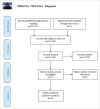Influenza vaccination in healthcare workers: A comprehensive critical appraisal of the literature
- PMID: 28787234
- PMCID: PMC5861785
- DOI: 10.1080/21645515.2017.1348442
Influenza vaccination in healthcare workers: A comprehensive critical appraisal of the literature
Abstract
Influenza imposes a significant burden worldwide from the healthcare and socio-economic standpoints. This is also due to suboptimal vaccination coverage among the target population, even though immunization is recommended since many years and still remains the fundamental tool for its prevention. Healthcare workers (HCWs) are at increased risk of exposure to respiratory pathogens compared with the general population, including flu, with potential threat for their health and for patients' safety. Nevertheless, despite recommendation for immunization of this work-category in most of Western Countries, inadequate flu vaccine uptake is reported during the last decade in the European area. According to recent systematic reviews on this topic, the main determinants of vaccine acceptance among HCWs have been largely investigated and include desire for self-protection and to protect family rather than absolute disease risk or desire to protect patients, among the main drivers. On the other hand, concerns regarding safety of the vaccines resulted in decreased vaccine uptake. Moreover, influenza vaccine hesitancy among HCWs was also associated with several issues such as low risk perception, denial of the social benefit of influenza vaccination, low social pressure, lack of perceived behavioral control, negative attitude toward vaccines, not having been previously vaccinated against influenza, not having previously had influenza, lack of adequate influenza-specific knowledge, lack of access to vaccination facilities, and socio-demographic variables. The topic of influenza vaccination among HCWs is challenging, full of ethical issues. Systematic reviews of randomized controlled trials (RCTs) investigating the effectiveness of interventions for improving vaccine uptake among HCWs found that combined strategies were more effective than isolate approaches. Mandatory policies are currently under debate in several countries. High quality studies would help policy-makers and stake-holders to shape evidence-based initiatives and programs to improve the control of influenza.
Keywords: Influenza vaccination; evidence-based medicine and evidence-based vaccinology; healthcare workers; occupational health; vaccine uptake.
Figures



References
-
- World Health Organization (WHO) Influenza (seasonal). Fact sheet November 2006. Available at http://www.who.int/mediacentre/factsheets/fs211/en/
-
- Lee N, Ison MG. Diagnosis, management and outcomes of adults hospitalized with influenza. Antivir Ther 2012; 17(1 Pt B):143-57; PMID:22311561; https://doi.org/10.3851/IMP2059 - DOI - PubMed
Publication types
MeSH terms
Substances
LinkOut - more resources
Full Text Sources
Other Literature Sources
Medical
